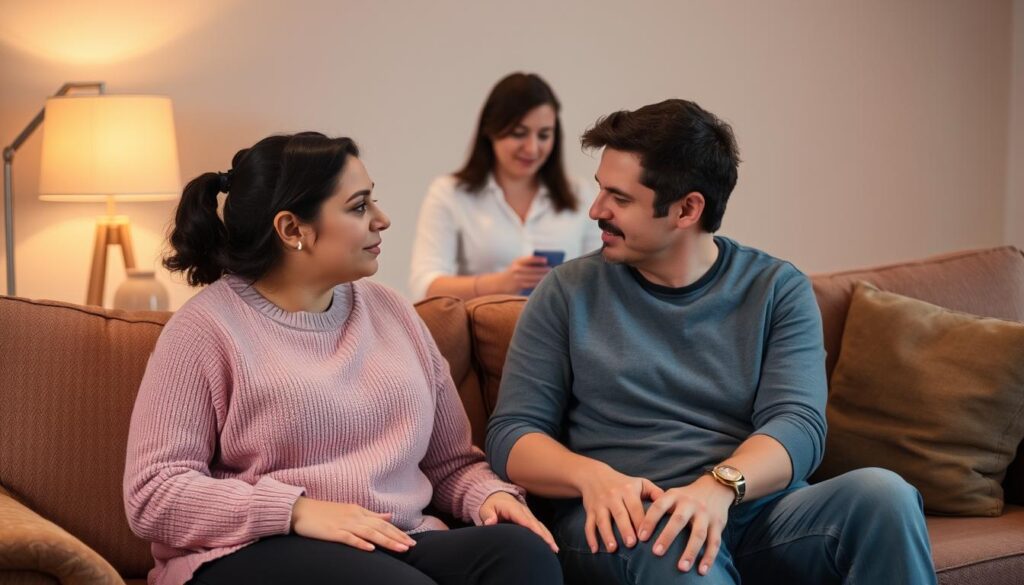We’ve all felt the weight of a strained connection. Moments when words fall short or misunderstandings linger are common. Relationships evolve, and even the strongest bonds can face challenges. But what if there was a way to reignite that spark?
Couples therapy isn’t just for relationships in crisis. It’s a tool for growth. It offers pathways to rebuild trust, clarify communication, and rediscover your partnership’s fullness.
Research shows 48% of couples see lasting improvements in relationship satisfaction after five years of couples therapy. Whether you’re navigating daily disagreements or deeper emotional distance, certified therapists at organizations like the Center for Couples and Family (CCF) guide partners through personalized sessions. Even long-standing communication issues can shift—75% of couples using Emotionally Focused Therapy (EFT) report meaningful progress, with 90% of these pairs sustaining gains for up to two years post-therapy. Relationship counseling isn’t a last resort; it’s an investment in the health of your partnership, whatever its stage.
Key Takeaways
- Couples therapy improves satisfaction for 48% of relationships over five years.
- Therapists at centers like the Center for Couples and Family help resolve root causes of conflict.
- Emotionally Focused Therapy (EFT) benefits 75% of couples, per APA studies.
- Most couples retain therapy gains for up to two years, per the Dyadic Adjustment Scale.
- Couples therapy supports all relationship stages, not just crises.
We’ve all felt the weight of a strained connection. Moments when words fall short or misunderstandings linger are common. Relationships evolve, and even the strongest bonds can face challenges. But what if there was a way to reignite that spark?
Couples therapy isn’t just for relationships in crisis. It’s a tool for growth. It offers pathways to rebuild trust, clarify communication, and rediscover your partnership’s fullness.
Research shows 48% of couples see lasting improvements in relationship satisfaction after five years of couples therapy. Whether you’re navigating daily disagreements or deeper emotional distance, certified therapists at organizations like the Center for Couples and Family (CCF) guide partners through personalized sessions. Even long-standing communication issues can shift—75% of couples using Emotionally Focused Therapy (EFT) report meaningful progress, with 90% of these pairs sustaining gains for up to two years post-therapy. Relationship counseling isn’t a last resort; it’s an investment in the health of your partnership, whatever its stage.
Key Takeaways
- Couples therapy improves satisfaction for 48% of relationships over five years.
- Therapists at centers like the Center for Couples and Family help resolve root causes of conflict.
- Emotionally Focused Therapy (EFT) benefits 75% of couples, per APA studies.
- Most couples retain therapy gains for up to two years, per the Dyadic Adjustment Scale.
- Couples therapy supports all relationship stages, not just crises.
What is Couples Therapy?
Couples therapy, also known as marriage therapy, is a safe place for partners to work on their relationship. Licensed therapists guide couples through tough times using proven methods. Over 75% of those who go see a therapist say their relationship gets better, building trust and understanding.
Definition and Overview
This therapy helps couples understand their relationship better. It focuses on issues like bad communication or feeling resentful. Sessions usually last 45–60 minutes and may include activities to make couples feel safe again.
The American Association for Marriage and Family Therapy says 98% of clients are very happy with therapy.
Purpose of Couples Therapy
Therapists teach couples how to solve problems in a healthy way. They work on skills like listening better, staying calm in disagreements, and showing respect. Dr. Cristina Raphael says therapy usually lasts up to six months to tackle deep issues.
Emotionally Focused Therapy (EFT) is one approach that helps couples manage their emotions better, reducing tension.
Common Issues Addressed
- Communication breakdown and unresolved conflicts
- Financial or parenting disagreements
- Trust issues stemming from infidelity or secrecy
- Emotional disconnection or intimacy struggles
Therapy also helps couples deal with big changes in life, like new jobs or family stress. It turns fights into chances for growth.
Signs That Couples Therapy May Help
Spotting early signs of relationship issues is key. Here’s how to know if couples counseling is right for you:
Frequent Arguments or Conflicts
Unresolved fights often hide deeper problems. Over 70% of couples face the same hurtful cycles again and again. Look out for:
- Arguments over small things that turn big
- Escalating tension in fights
- Ignoring problems, hoping they’ll disappear
Emotional Disconnection
Feeling far from your partner? Over half of couples feel emotionally distant. Signs include:
- Less laughter and meaningful talks
- Physical touch becoming rare or awkward
- Feeling more like roommates than partners
Major Life Changes or Stressors
Big life changes, like job loss or having kids, can strain relationships. Key stressors include:
- Unresolved grief or trauma
- Health crises or money troubles
- Adjusting to new roles (e.g., empty nest, retirement)
| Sign | Percentage of Couples Affected |
|---|---|
| Unresolved Arguments | 70% |
| Emotional Distance | 50% |
| Life Transitions | 60% |
Waiting too long to get help can make things worse. Early couples counseling tackles these issues before they’re huge problems. Small steps today can lead to stronger bonds tomorrow.
Benefits of Couples Therapy
Couples therapy brings big changes that last long after the sessions end. It helps partners build a stronger bond and healthier relationship. Studies show over 70% of couples see big improvements in communication skills and emotional intimacy.

Improved Communication Skills
Therapy teaches couples how to turn misunderstandings into real talks. They learn to use “I” statements to avoid blame and practice active listening. This way, 70% of couples get better at talking to each other.
- Practice expressing needs without blame using “I feel” statements.
- Active listening exercises to ensure mutual understanding.
Enhanced Emotional Connection
Building emotional intimacy is a big part of therapy. Couples do things like gratitude exercises and set goals together. This helps 80% of couples feel closer emotionally. Therapy also helps them connect through mindfulness and sharing their feelings.
Conflict Resolution Strategies
Therapy turns fights into useful talks. Therapists teach couples how to spot problems and find solutions. Over 60% of couples stop fighting as much by seeing disagreements as challenges to solve together.
- Identify emotional triggers to address root causes.
- Develop compromise strategies tailored to relationship dynamics.
| Benefit | Data-Driven Insight |
|---|---|
| Communication Skills | 70% of couples improve communication within 6-20 sessions. |
| Emotional Intimacy | 80% report stronger emotional bonds after therapy. |
| Conflict Resolution | 60% reduction in destructive arguments post-therapy. |
Different Approaches to Couples Therapy
Every couple’s journey is unique. Choosing the right couples therapy starts with understanding your options. Therapists tailor methods to fit your goals, whether it’s improving communication or resolving deeper emotional barriers.
Emotionally Focused Therapy (EFT)
EFT focuses on emotional bonds and secure attachment. Therapists help couples identify negative interaction cycles, such as criticism or defensiveness. This approach has a 70-75% success rate, strengthening emotional safety and connection.
Sessions guide partners to express their needs and validate each other’s feelings. This helps build a stronger emotional bond.
Cognitive Behavioral Therapy (CBT)
CBT targets unhelpful thought patterns that impact relationships. Therapists teach skills to challenge negative beliefs and replace them with constructive behaviors. Research shows 60-70% improvement in couples facing trust issues or anger management.
Techniques include role-playing and homework exercises. These help couples change their thought patterns and behaviors.
Imago Relationship Therapy
Imago explores how childhood experiences influence adult relationships. Therapists use structured dialogue to help partners see each other as mirrors of their unmet childhood needs. With a 65% success rate, it encourages mutual respect and deeper understanding through mirroring exercises.
Other methods like the Gottman Method (94% accuracy in predicting stability) and Solution-Focused Therapy offer tailored solutions. Many therapists blend approaches, combining EFT’s emotional focus with CBT’s practical tools. Studies show mixed methods boost satisfaction by 50% over single approaches.
Many relationship workshops and group sessions complement these therapies. These programs teach skills like active listening or conflict resolution in group settings. The best fit depends on your goals and openness to change—effective therapy requires commitment from both partners.
What to Expect in Therapy Sessions
Learning about couples counseling can make you feel more at ease. We’ve outlined what happens in each part of therapy, from the first meeting to ongoing progress. Many sessions mix talking together and alone to tackle issues like communication problems or unresolved conflicts.
Structure of a Typical Session
Most therapy sessions have a clear pattern. The first visit usually lasts 50 minutes to learn about your relationship and goals. Later sessions, lasting 60–90 minutes, might include:
| Phase | Activities |
|---|---|
| Initial Session | Assessment of relationship dynamics and personal concerns |
| Joint Sessions | Guided discussions to practice active listening or conflict resolution |
| Individual Time | Private check-ins to address personal emotions or perspectives |
Role of the Therapist
Therapists are impartial guides, not judges. They play important roles such as:
- Identifying communication patterns that strain the relationship
- Teaching tools like “I-statements” to reduce blame
- Helping partners explore childhood influences on current conflicts
Confidentiality and Privacy Considerations
All shared information stays private, unless there’s a safety risk. Over 90% of clients feel safe sharing sensitive topics because of strict confidentiality. Therapists explain these rules early to build trust.
With clear expectations, couples therapy aims to help you grow through structured guidance and mutual respect. It provides a safe space to tackle challenges while working towards shared goals.
How to Choose the Right Couples Therapist
Finding the right therapist is key for real progress in marriage therapy. Look for licensed professionals with titles like LMFT (Licensed Marriage and Family Therapist) or LCSW. They often use methods like the Gottman Method or Emotionally Focused Therapy (EFT).
Qualifications and Credentials
- Make sure they are licensed and have certifications like AAMFT membership.
- Choose therapists with 5+ years of experience in couples counseling.
- Look for those with specialized training in areas like infidelity or financial stress.
Specializations and Techniques
| Technique | Focus Areas |
|---|---|
| Gottman Method | Building trust, conflict resolution |
| Emotionally Focused Therapy | Emotional bonding, security |
| Cognitive Behavioral Therapy | Changing negative thought patterns |
Ask if they offer couples retreat programs for in-depth sessions or tailored approaches to your cultural or lifestyle needs.
Scheduling an Initial Consultation
Use directories like Psychology Today to find therapists by location and specialty. In the first meeting, talk about:
“How do you handle communication breakdowns?” “What success rates do you typically see?”
Make sure both partners feel understood and the therapist’s style matches your goals. Most effective therapists offer free 15-minute consultations to check if you’re a good fit.
Remember: 85% of clients prefer therapists with couples-specific training. Begin by looking at online reviews and asking friends for recommendations—60% of couples find their therapist this way.
Financial Considerations for Couples Therapy
Starting early with financial talks makes couples therapy more accessible. We’ll cover costs, insurance, and payment plans to help you.

First, let’s talk about couples therapy costs. Prices vary based on several factors:
Average Cost of Sessions
Prices usually fall between $100 and $250 per hour in the U.S. Costs can change based on:
- Therapist experience level
- Where you live (urban areas tend to be pricier)
- How long and intense the sessions are
Insurance Coverage
Many insurance plans cover mental health services. But, coverage for relationship issues can vary. Check your policy for:
- Does it cover couples counseling or just individual therapy?
- Are there pre-authorization or diagnosis needs?
- Are there options for out-of-network care?
“Open financial discussions improve relationship satisfaction by 40% for couples who manage finances together.”
Payment Options and Sliding Scale Fees
Therapists often have affordable options:
| Option | Description | Availability |
|---|---|---|
| Sliding Scale Fees | Adjusted based on household income | Available at private practices |
| Community Clinics | Low-cost programs at public health centers | Depends on local resources |
| Payment Plans | Divide costs into monthly installments | Negotiable with therapists |
Talk about these options early to find the best fit for you.
Frequently Asked Questions About Couples Therapy
Many couples starting therapy have lots of questions. Here are answers to common concerns, based on research and real experiences.
How Long Does Couples Therapy Usually Take?
- Typically 8–20 sessions, depending on goals and commitment
- Weekly sessions often reduce to biweekly as progress occurs
- Maintenance sessions may continue long-term for sustained growth
Can Couples Therapy Work for Any Relationship?
“48% of couples report improved relationship satisfaction after 5 years of therapy.”
While there’s no promise, studies show 75% see less distress when both partners are involved. Conflict resolution skills learned can change even long-standing issues. Premarital counseling, for example, helps couples prepare for shared goals.
What If One Partner Doesn’t Want to Attend?
Individual relationship counseling can start the process. Even one partner improving conflict resolution habits can change things. Therapists might suggest discernment counseling (1–5 sessions) to help clarify relationship goals.
Over 65% of couples say communication is their main issue. Addressing this early often makes them more open to therapy.
Therapy isn’t a quick fix, but 70% of couples with shared goals see lasting improvements. The key? Being open to learning and adapting together.
Taking the First Step Toward Therapy
Starting couples therapy is brave. It shows you’re ready to grow together. Many couples wait too long, but 70% see big improvements after therapy. It starts with honesty and a shared goal to change.
Acknowledging the Need for Help
Feeling nervous before therapy is normal for over 40% of couples. Emotional readiness is key. Both partners need to be open. Setting small goals, like better communication, makes it easier.
Therapy works best with consistent effort over 12–20 sessions. Studies back this up.
Communicating Your Intentions to Your Partner
Use “I” statements when talking about therapy. Say, “I think we can grow together with therapy.” Focus on goals, not blame. Turning uncertainty into teamwork is possible.
Workshops or retreats, like those from The Gottman Institute, can help. They make deeper work easier.
Resources for Finding Support
Start with directories like the American Association for Marriage and Family Therapy. They list licensed therapists (LMFT, LPC). Look into workshops or retreats for specific needs. Online platforms like BetterHelp offer easy first steps.
Therapy’s impact grows with active participation from both. Choosing the right therapist and embracing growth can strengthen your bond. Your first step today could lead to lasting change tomorrow.
FAQ
How Long Does Couples Therapy Usually Take?
Can Couples Therapy Work for Any Relationship?
What If One Partner Doesn’t Want to Attend?
What Are the Benefits of Couples Therapy?
How Do We Know If We Should Seek Therapy?
What Should We Expect During Therapy Sessions?
How Can We Choose the Right Couples Therapist?
What Are the Financial Considerations for Couples Therapy?
How Can We Prepare for Our First Therapy Session?
Source Links
- 5 Ways Couples Therapy Can Revitalize Your Relationship – https://www.papsychotherapy.org/blog/5-ways-couples-therapy-can-revitalize-your-relationship
- How Couples Therapy Can Improve Your Relationship – https://www.linkedin.com/pulse/how-couples-therapy-can-improve-your-relationship-lyfsmile-iesuc
- Couples Therapy: What It Is and How to Prepare – Grow Therapy – https://growtherapy.com/blog/what-to-know-about-couples-therapy/
- What Is Couples Therapy? – https://www.verywellmind.com/couples-therapy-definition-types-techniques-and-efficacy-5191137
- 10 Signs You And Your Partner Need Couples Counseling – https://www.griefrecoveryhouston.com/signs-partner-need-couples-counseling/
- 15 Clear Signs That Signal It’s Time for Couples Therapy – https://www.linkedin.com/pulse/15-clear-signs-signal-its-time-couples-therapy-sylvia-smith-dacwf
- What Is Couples Counseling? – https://www.verywellhealth.com/couples-counseling-5205837
- How Couples Therapy Can Strengthen Your Relationship | Relational Psych – https://www.relationalpsych.group/articles/how-couples-therapy-can-strengthen-your-relationship
- Is Couples Therapy the Answer? – https://www.lyrahealth.com/blog/couples-therapy/
- Understanding the Different Types of Couples Therapy Techniques – https://www.selfspaceseattle.com/blog/2024/4/1/understanding-the-different-types-of-couples-therapy-techniques
- The Most Effective Types of Couples Therapy – NY Mental Health Center – https://nymentalhealthcenter.com/the-most-effective-types-of-couples-therapy/
- What to Expect at Couples Therapy: How it Works & FAQs — Dr. Dena DiNardo – https://www.drdenadinardo.com/blog/what-to-expect-couples-therapy
- What to Expect in Your First Couples Therapy Session – https://bayareacbtcenter.com/what-to-expect-in-your-first-couples-therapy-session/
- Starting Couples Therapy: What to Expect & How to Prepare – https://helloalma.com/blog/starting-couples-therapy-what-to-expect-how-to-prepare/
- 10 Essential Tips for Choosing the Right Relationship Therapist for You – https://www.linkedin.com/pulse/10-essential-tips-choosing-right-relationship-therapist-sylvia-smith-moavf
- Couples therapy: Who it’s for, how it works, and how to choose a therapist – https://therapist.com/types-of-therapy/couples-therapy/
- How to Choose a Marriage Counselor: 10 Practical Ways – https://www.marriage.com/advice/counseling/what-to-consider-when-choosing-a-marriage-counselor/
- Effective Financial Management for Couples: Guidance from Gottman Therapy – Ascension Counseling & Therapy – https://ascensioncounseling.com/effective-financial-management-for-couples-guidance-from-gottman-therapy
- Finance Issues in Relationships | Couples Counselling — Williamson & Associates <br/> – https://counsellinginalberta.com/blog/financial-stress-couples-counselling
- Couples Therapy FAQs | Irina Firstein, LCSW – https://www.nyccouplestherapists.com/couples-therapy-faqs/
- 21 Questions Your Therapist Will Ask You During Couples Counseling – https://holdinghopemft.com/21-essential-couples-therapy-questions-to-deepen-your-relationship/
- Marriage and Relationship Counseling FAQ’s – https://couplescounselingofdenver.com/relationship-counseling-frequently-asked-questions/
- How to Prepare for Couples Therapy | All Points North – https://apn.com/resources/how-to-prepare-for-couples-therapy/
- Couples Therapy: How to Prepare for Your First Session – https://siliconvalleytherapy.com/couples-therapy-how-to-prepare-for-your-first-session/

